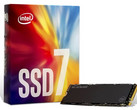The company has revealed its plans for releasing their QLC SSDs in a small roadmap at the A3 Technology Live Conference in London and announced that the drives would release soon. Their QLC SSDs will be targeted towards the enterprise market and use a regular SATA interface. Micron has also shown a wafer with their new 64 GB QLC chips.
QLC, short for quad-level cell, is able to store four bits of data in one memory cell. The 4 bit per cell technology greatly increases available storage capacity compared to current SSDs, but it does come at a cost of lower performance and a shorter lifespan. QLC provides a 33% capacity boost compared to TLC (3 bit/cell) SSDs and can offer double the capacity of an MLC (2 bit/cell) SSD for the same price. SLC or single-level cell memory is the most expensive, but also offers the highest performance and the best reliability.
Micron states that the lower production costs of QLC memory will allow them to compete more aggressively with current TLC and MLC drives, but the company wants to compete with traditional hard drives as well. The chip manufacturer iterates that SSDs equipped with QLC memory are best used as data storage with a heavy focus on reading instead of writing.
Specific availability and pricing details are yet to be announced. Other chip manufacturers such as Samsung, Toshiba, Western Digital and SK Hynix are also developing solid state drives with QLC memory.






















